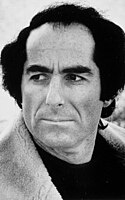Philip Roth Quote
You fight your superficiality, you shallowness, as as to come at people without unreal expectations, without an overload of bias or hope or arrogance, as untank-like as you can be, sans cannon and machine guns and steel plating half a foot thick; you come at them unmenacingly on your own ten toes instead of tearing up the turf with your caterpillar treads, take them on with an open mind, as equals, man to man, as we used to say, and yet you never fail to get them wrong, you might as well have the brain if a tank. You get them wrong before you meet them, while you're anticipating meeting them; you get them wrong while you're with them; and them you go home to tell somebody else about the meeting and you get them wrong again. Since the same generally goes for them with you, the whole thing is really a dazzling illusion empty of all perception an astonishing farce of misperception. And yet what are we to do about this terribly significant business of other people, which gets bled of the significance we think it has and takes on instead a significance that is ludicrous, so ill equipped are we all to envision one another's interior workings and invisible aims? Is everyone to go off and lock the door and sit secluded like the lonely writers do, in a soundproof cell, summoning people out of words, and then proposing that there word people are closer to the real thing than we mangle with our ignorance every day? The fact remains that getting people right is not what living is all about anyway. It's getting them wrong that is living, getting them wrong and wrong and wrong and then, on careful consideration, getting them wrong again. That's how we know we're alive: we're wrong. Maybe the best thing would be to forget being right or wrong about people and just go along for the ride. But if you can do that - well, lucky you.
You fight your superficiality, you shallowness, as as to come at people without unreal expectations, without an overload of bias or hope or arrogance, as untank-like as you can be, sans cannon and machine guns and steel plating half a foot thick; you come at them unmenacingly on your own ten toes instead of tearing up the turf with your caterpillar treads, take them on with an open mind, as equals, man to man, as we used to say, and yet you never fail to get them wrong, you might as well have the brain if a tank. You get them wrong before you meet them, while you're anticipating meeting them; you get them wrong while you're with them; and them you go home to tell somebody else about the meeting and you get them wrong again. Since the same generally goes for them with you, the whole thing is really a dazzling illusion empty of all perception an astonishing farce of misperception. And yet what are we to do about this terribly significant business of other people, which gets bled of the significance we think it has and takes on instead a significance that is ludicrous, so ill equipped are we all to envision one another's interior workings and invisible aims? Is everyone to go off and lock the door and sit secluded like the lonely writers do, in a soundproof cell, summoning people out of words, and then proposing that there word people are closer to the real thing than we mangle with our ignorance every day? The fact remains that getting people right is not what living is all about anyway. It's getting them wrong that is living, getting them wrong and wrong and wrong and then, on careful consideration, getting them wrong again. That's how we know we're alive: we're wrong. Maybe the best thing would be to forget being right or wrong about people and just go along for the ride. But if you can do that - well, lucky you.
Related Quotes
In order to understand why one chooses to be a Tantric practitioner, there has to be an understanding of cause and effect, cyclic existence, the awareness that the reality that we think we are seeing...
About Philip Roth
Roth was one of the most honored American writers of his generation. He received the National Book Critics Circle award for The Counterlife, the PEN/Faulkner Award for Operation Shylock, The Human Stain, and Everyman, a second National Book Award for Sabbath's Theater, and the Pulitzer Prize for American Pastoral. In 2005, the Library of America began publishing his complete works, making him the second author so anthologized while still living, after Eudora Welty. Harold Bloom named him one of the four greatest American novelists of his day, along with Cormac McCarthy, Thomas Pynchon, and Don DeLillo. In 2001, Roth received the inaugural Franz Kafka Prize in Prague.
